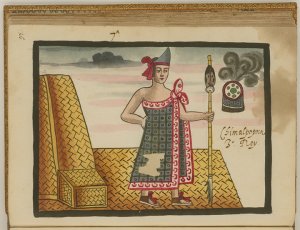Presented By: Classical Studies
Mexica Past, Creole Present
Erika Valdivieso, Assistant Professor, Yale University

Gerald F. Else Lecture in the Humanities
---
This talk examines the role of the Mexica past in José Antonio de Villerías' Guadalupe, a Latin epic from baroque Mexico. Written at the start of the eighteenth century, this text reflects different strategies whereby elite Spanish Americans, or creoles, began to separate themselves from Iberians, on the one hand, and from indigenous Americans, on the other. Attention to the epic's deployment of words like indigenus and nativus shed light on how this text recuperates indigeneity as it eliminates Indigenous peoples from Mexican history. Virgil’s visual art informs scenes of historical fiction in Guadalupe, which rewrite the past to create a natural transition from the greatness of Tenochtitlan to the splendor of creole Mexico. First, the epic draws on Virgil’s ecphrasis of the Temple of Juno to graft Aztec or Mexica history onto ancient monuments, following a creole tradition of identifying pre-Columbian civilizations as their classical heritage. Second, in an epic catalogue of flowers, the text turns to the pseudo-Virgilian Culex to harmonize creole and Spanish claims to the Virgin of Guadalupe’s divine favor. The interweaving of Latin, Greek, and Nahua names for these flowers positions creoles, and not Spaniards, as the spiritual heirs to the Mexica “empire.”
Erika Valdivieso is an assistant professor of Classics at Yale University, where she is a faculty member of the Program in Early Modern Studies. Her current project, provisionally titled "Empire's Companion: Virgilian Epics from the Amerias," draws attention to the relationship between education, literature, and imperial imagination in four Latin epics from Iberoamerica. She is interested in the history of the book in Spanish and Portuguese America and has published on the dissemination and transmission of classical texts in early modernity.
---
This talk examines the role of the Mexica past in José Antonio de Villerías' Guadalupe, a Latin epic from baroque Mexico. Written at the start of the eighteenth century, this text reflects different strategies whereby elite Spanish Americans, or creoles, began to separate themselves from Iberians, on the one hand, and from indigenous Americans, on the other. Attention to the epic's deployment of words like indigenus and nativus shed light on how this text recuperates indigeneity as it eliminates Indigenous peoples from Mexican history. Virgil’s visual art informs scenes of historical fiction in Guadalupe, which rewrite the past to create a natural transition from the greatness of Tenochtitlan to the splendor of creole Mexico. First, the epic draws on Virgil’s ecphrasis of the Temple of Juno to graft Aztec or Mexica history onto ancient monuments, following a creole tradition of identifying pre-Columbian civilizations as their classical heritage. Second, in an epic catalogue of flowers, the text turns to the pseudo-Virgilian Culex to harmonize creole and Spanish claims to the Virgin of Guadalupe’s divine favor. The interweaving of Latin, Greek, and Nahua names for these flowers positions creoles, and not Spaniards, as the spiritual heirs to the Mexica “empire.”
Erika Valdivieso is an assistant professor of Classics at Yale University, where she is a faculty member of the Program in Early Modern Studies. Her current project, provisionally titled "Empire's Companion: Virgilian Epics from the Amerias," draws attention to the relationship between education, literature, and imperial imagination in four Latin epics from Iberoamerica. She is interested in the history of the book in Spanish and Portuguese America and has published on the dissemination and transmission of classical texts in early modernity.